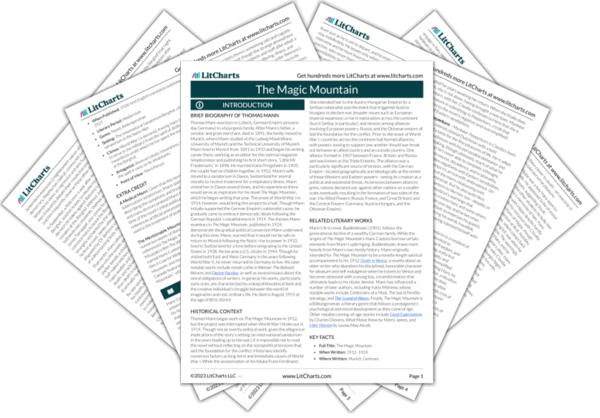Summary
Analysis
At meals in the dining hall, Hans realizes he’s still experiencing the same tremor he first felt on his Sunday walk. He tries desperately to conceal his weakness but cannot. Hans realizes, much to his dismay and disgust, that this symptom is both the result of his new environment and “an inner excitement.” Madame Chauchat is always late to meals, and she always slams the door. Hans knows that each time this happens, he’ll flinch and then his face will turn cold. Though at first he glares at her as she walks to the Good Russian table, eventually he stops, feeling ashamed that he ever felt he had a right to judge her.
The “inner excitement” Hans feels is a clear nod to Krokowski’s lecture about repressed passions and a confirmation that his feelings toward sickly Clavdia have shifted from disgust to enchantment. This, in turn, symbolizes Hans’s shifting attitude toward the sickly world of the Berghof, too, and the freedom that Hans believes he might find there.
Themes
Fräulein Engelhart, the schoolteacher and Hans’s tablemate, realizes that the slamming of doors is creating a bond between Hans and Frau Chauchat—and that Hans’s feigned indifference only strengthens that bond. In response, Fräulein Engelhart starts to bring up Chauchat in conversation as often as she can, urging Hans to go talk to her. She thinks everyone loves careless people, even if they want to think they don’t. In fact, Frau Chauchat is quite charming, Engelhart insists.
Fräulein Engelhart’s comment about everyone loving careless people, even if they want to convince themselves that they don’t, gets at the heart of Hans’s attraction to Clavdia. He wants to deny his feelings because Clavdia, on the surface, embodies everything his bourgeois sensibilities have taught him to reject: she is passionate, ill-mannered, and directionless. Yet his attraction to her suggests that he longs to embody these traits himself—a longing he conceals with indifference, perhaps out of shame.
Themes
Hans asks Fräulein Engelhart for more information about Frau Chauchat—is she really married? He’s noticed that she doesn’t wear a ring. Fräulein Engelhart assures Hans that Frau Chauchat is married but perhaps is just too liberal to feel it’s necessary to wear a ring—all Russian women are quite liberated, Fräulein Engelhart assures Hans (Fräulein Engelhart is from a city near the Russian border and thus knows these things). Fräulein Engelhart explains that Frau Chauchat’s husband is a civil servant with the Russian government and that he hasn’t visited her at the Berghof even once. Fräulein Engelhart also tells Hans that this is Frau Chauchat’s third time here. It’s curious because while she’s certainly ill, she’s not quite ill enough to warrant staying at a sanatorium. She thinks maybe Frau Chauchat just doesn’t like being around her husband.
Fräulein Englelhart’s remark about “liberated” Russian women seems to be a veiled remark about their godless disregard for the sanctity of marriage. Not wearing a wedding ring, Fräulein Engelhart seems to suggest, indicates that Russian women might not remain faithful to their husbands. This detail links Clavdia (and by extension, the Eastern sensibilities she represents in the novel) with immorality and irrational passion.
Themes
Hans suggests that Fräulein Engelhart is being too generous toward Frau Chauchat—surely she’s not so pure. But though this is what he says aloud, inside he knows that Fräulein Engelhart’s high opinion of Frau Chauchat is valid. To hide his inner thoughts, though, he jokes that Fräulein Engelhart has a crush on Frau Chauchat and begins to refer to her as Fräulein Engelhart’s “Russian miss,” and “Lovely Minka.” Fräulein Engelhart scolds Hans, but both of them know the truth: Hans teases Fräulein Engelhart because he wants to hear about Frau Chauchat, and Fräulein Engelhart scolds Hans because she likes to be teased.
Hans and Fräulein Engelhart’s joking banter implicitly reinforces some of the main focuses of Krokowski’s recent lecture. Their dialogue and actions are driven by unconscious (or at least unexpressed) desires: Hans projects his feelings for Frau Chauchat onto Fräulein Engelhart. Meanwhile, Fräulein Engelhart denies her desire to be teased.
Themes
Get the entire The Magic Mountain LitChart as a printable PDF.

Eventually, Hans learns from Fräulein Engelhart that Frau Chauchat’s first name is Clavdia. Unlike before, Hans doesn’t try to hide is delight at learning more about Frau Chauchat. And as he walks around, he also starts to sing and hum love songs to himself. He scolds himself for being so foolish about his “relationship” with Frau Chauchat—maybe if he were a normal young man down in the flatlands such behavior would’ve been appropriate, but up here it makes no sense. Still, whereas before his beating heart had had no identifiable cause, now it’s clear that thoughts of Frau Chauchat make his heart pound.
Hans’s feelings for Clavdia reinforce the link between physical ailment and repressed inner feeling, with Hans’s pounding heart functioning as a physical symptom of his repressed, irrational passion for a woman it makes no sense for him to be attracted to. Now that Hans (and readers) know Madame Chauchat’s full name, it's worth analyzing the full name’s symbolism. Clavdia (spelled “Clawdia” in some editions of the book) contains the word “claw,” perhaps alluding to her capacity to use her sensuality to trap Hans in her claws. Her last name, Chauchat, has a few possible interpretations. A Chauchat was a machine gun the French Army used during World War I, hinting at the self-destructive nature of Han’s irrational attraction to Clavdia.
Themes












